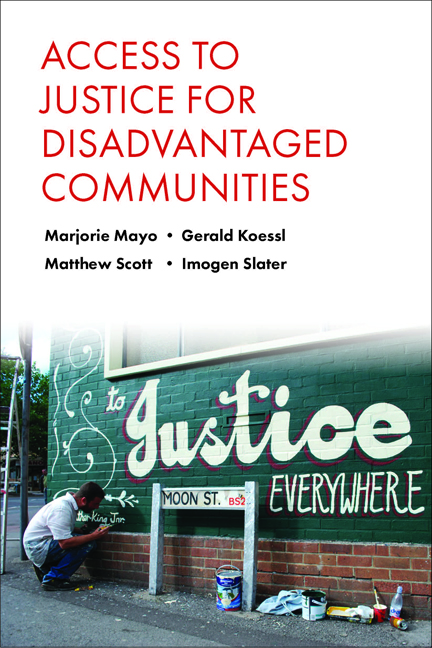Book contents
- Frontmatter
- Dedication
- Contents
- Acknowledgements
- Abbreviations and glossary
- Introduction: accessing social justice in disadvantaged communities
- one Social justice and the welfare state
- two Concepts of justice and access to justice
- three Ethos and values
- four Challenges and dilemmas
- five Public service modernisation, restructuring and recommodification
- six Conflict and competition versus collaboration and planning
- seven Public service modernisation and time
- eight Alienation and demoralisation, or continuing labours of love?
- nine Access to social justice for disadvantaged communities: value and values
- Appendix 1 Research methodology and questionnaire
- Appendix 2 Law Centres included
- Appendix 3 Topic guides for semi-structured interviews
- References
- Index
Introduction: accessing social justice in disadvantaged communities
Published online by Cambridge University Press: 01 February 2022
- Frontmatter
- Dedication
- Contents
- Acknowledgements
- Abbreviations and glossary
- Introduction: accessing social justice in disadvantaged communities
- one Social justice and the welfare state
- two Concepts of justice and access to justice
- three Ethos and values
- four Challenges and dilemmas
- five Public service modernisation, restructuring and recommodification
- six Conflict and competition versus collaboration and planning
- seven Public service modernisation and time
- eight Alienation and demoralisation, or continuing labours of love?
- nine Access to social justice for disadvantaged communities: value and values
- Appendix 1 Research methodology and questionnaire
- Appendix 2 Law Centres included
- Appendix 3 Topic guides for semi-structured interviews
- References
- Index
Summary
This book explores the dilemmas being faced by professionals and volunteers who are aiming to provide access to justice for all and to promote social justice agendas in increasingly challenging contexts. Public service modernisation has been accompanied by increasing marketisation and massive public expenditure cuts, with escalating effects in terms of the growth of social inequalities. As the following chapters illustrate, Law Centres have provided a lens through which to examine the implications of these wider policies, as increasing marketisation has been impacting upon staff and volunteers working to promote social justice in disadvantaged communities.
Given their underpinning ethos and missions, Law Centres offer particular insights into the tensions inherent in increasing marketisation, against a background of public service modernisation agendas more generally. Although they have been valuable as a means of exploring these issues, Law Centres have been relatively under-researched in the past, and so they have provided a relatively fresh context within which to investigate experiences of these wider issues and potential tensions.
Social justice has been a central public policy theme, from the discussions that led up to the development of post-war welfare state reforms in Britain through to more recent debates on social welfare and social justice in contemporary Britain. ‘Everybody is in favour of social justice’, it has been argued, even if ‘what they mean by social justice, the priority they accord to it, relative to other objectives, and the public policies they believe follow from it, vary widely’ (Burchardt and Craig, 2008, p 1). ‘Although few say they agree with injustice’, as Dorling points out, ‘nevertheless we live in an unjust world’ (Dorling, 2010, p 1).
The welfare state has itself been the subject of continuing debate since that time, and particularly so in recent years as successive governments have developed strategies to promote public service reforms, significantly changing the respective roles to be played by the state, civil society and the private market. Increasing the use of market mechanisms has been presented as a central plank of public service modernisation. This has not only been advocated as a means of ensuring value for money in times of public expenditure constraint (although that clearly has been a central concern); the increased use of market mechanisms has, in addition, been presented as a mechanism for promoting user choice, putting the consumer rather than the producers of welfare in the driving seat.
- Type
- Chapter
- Information
- Access to Justice for Disadvantaged Communities , pp. 1 - 8Publisher: Bristol University PressPrint publication year: 2014



